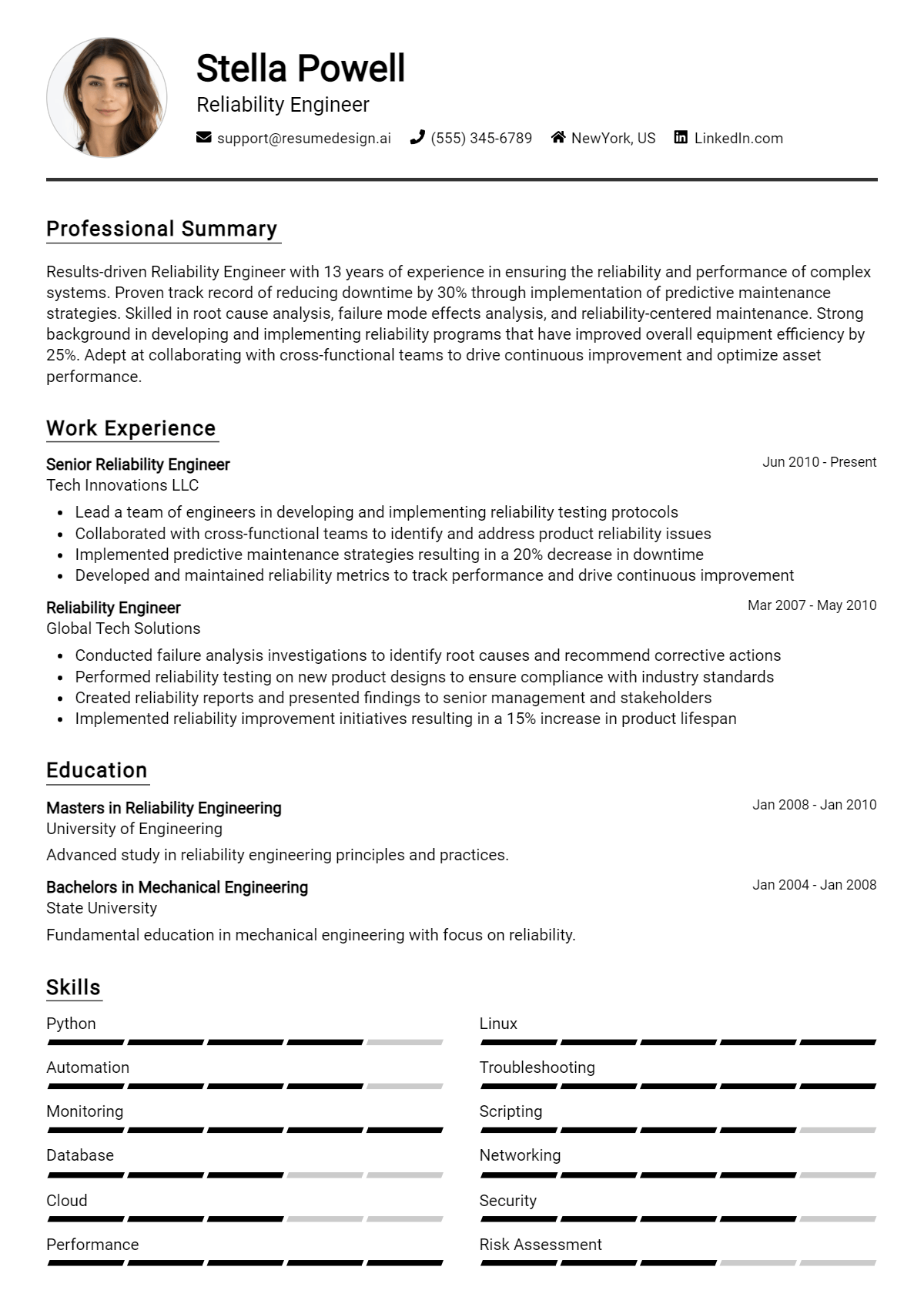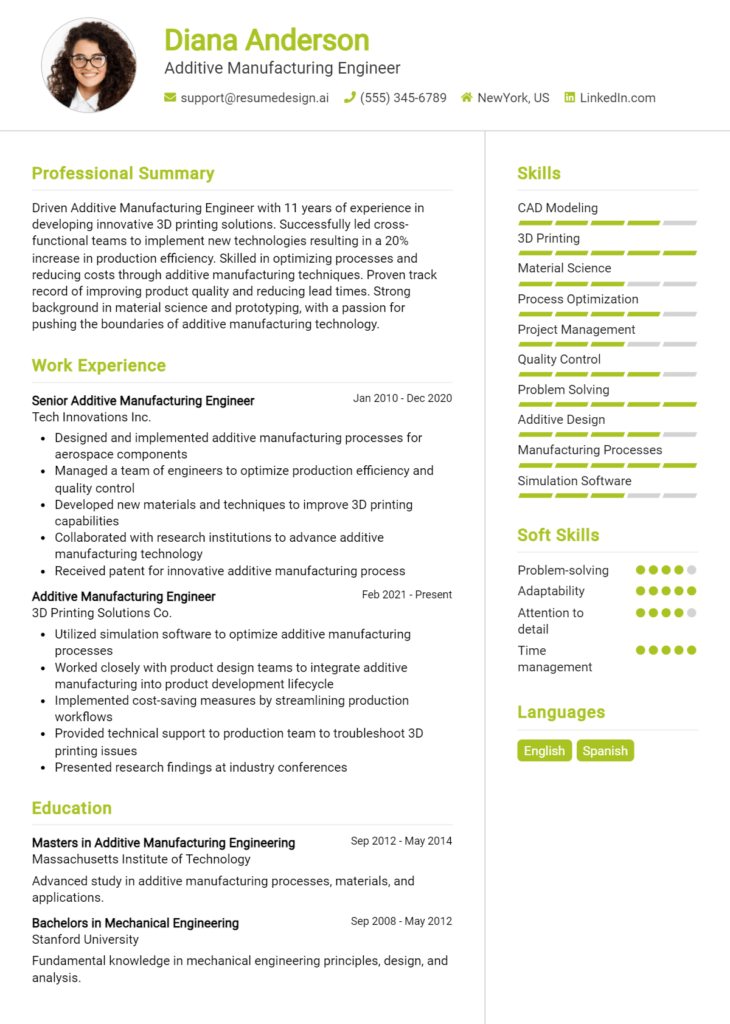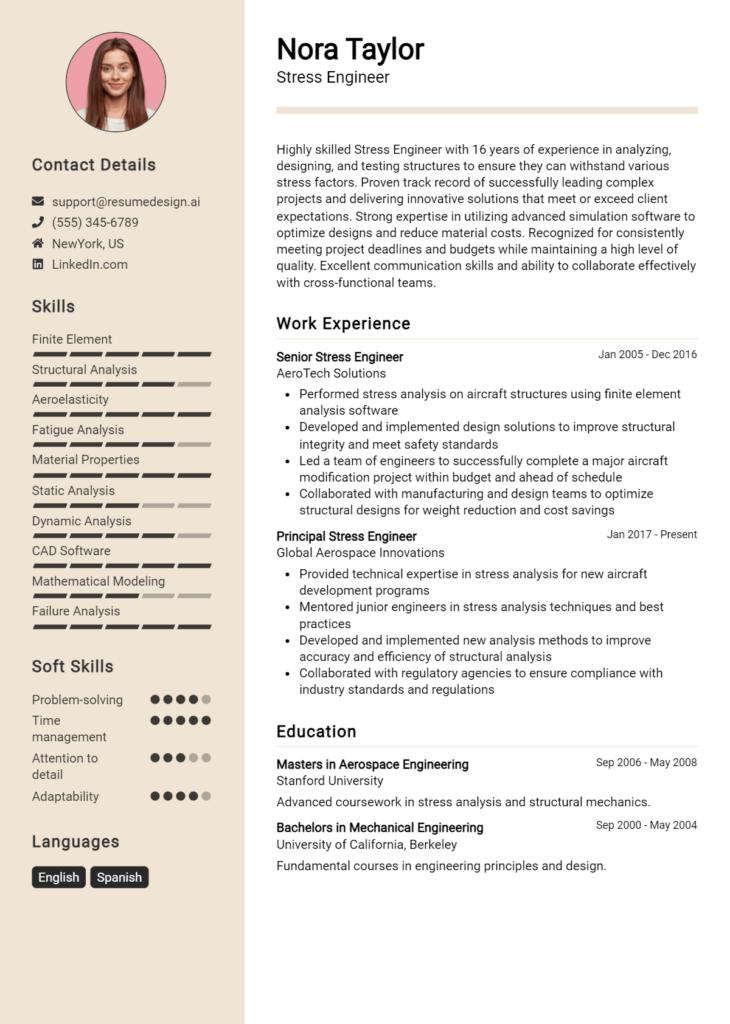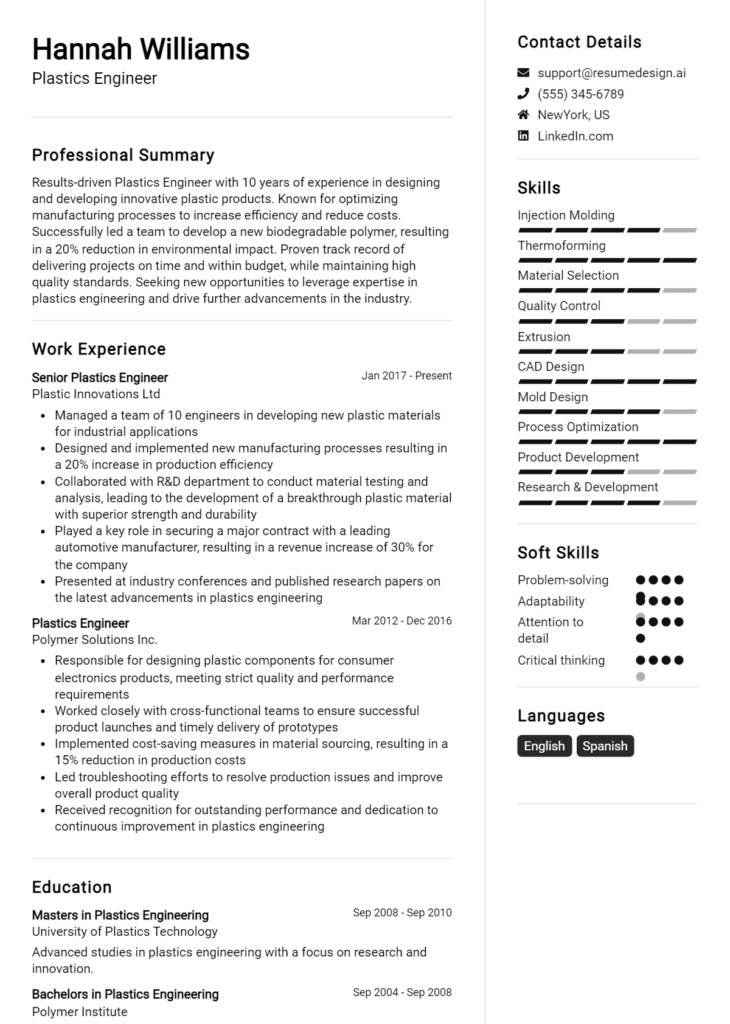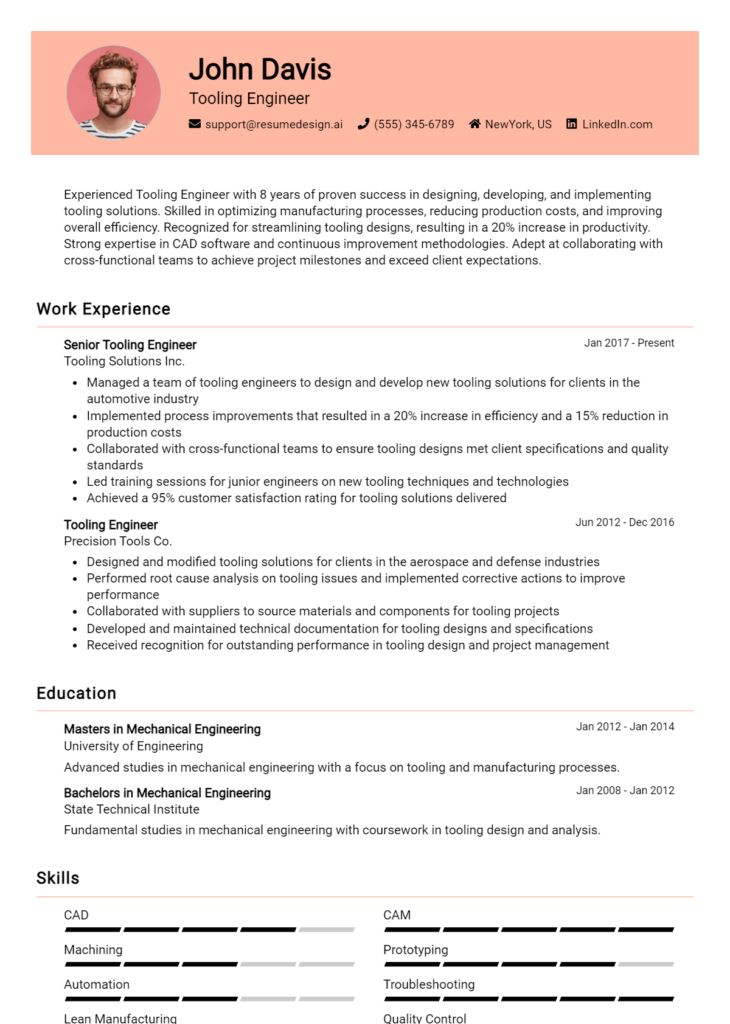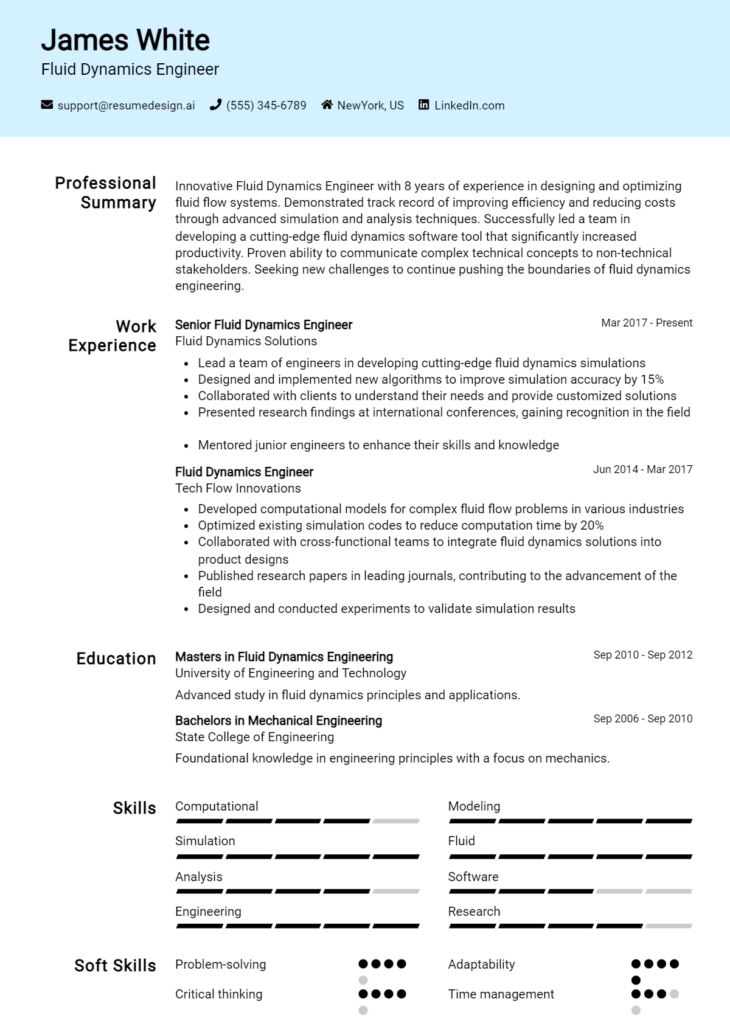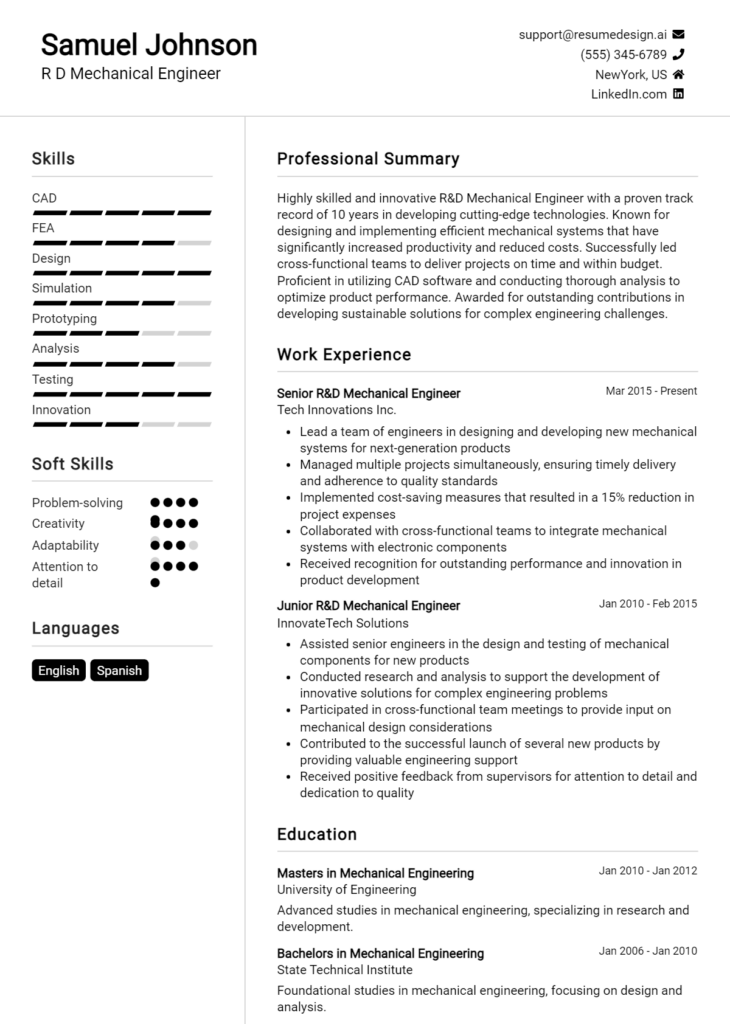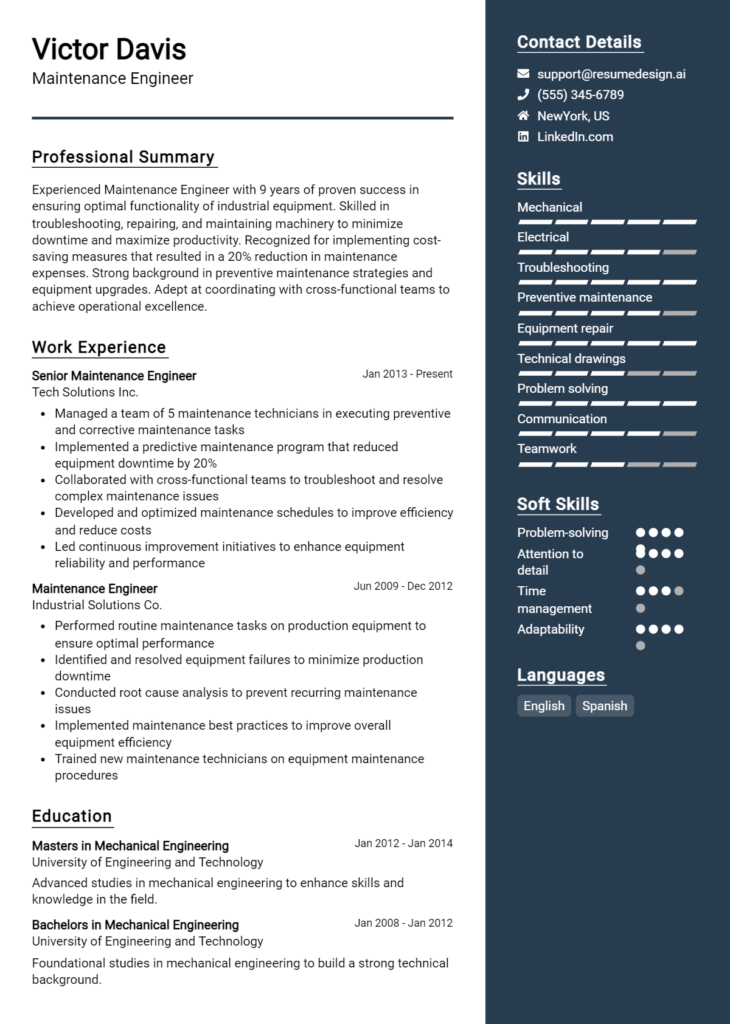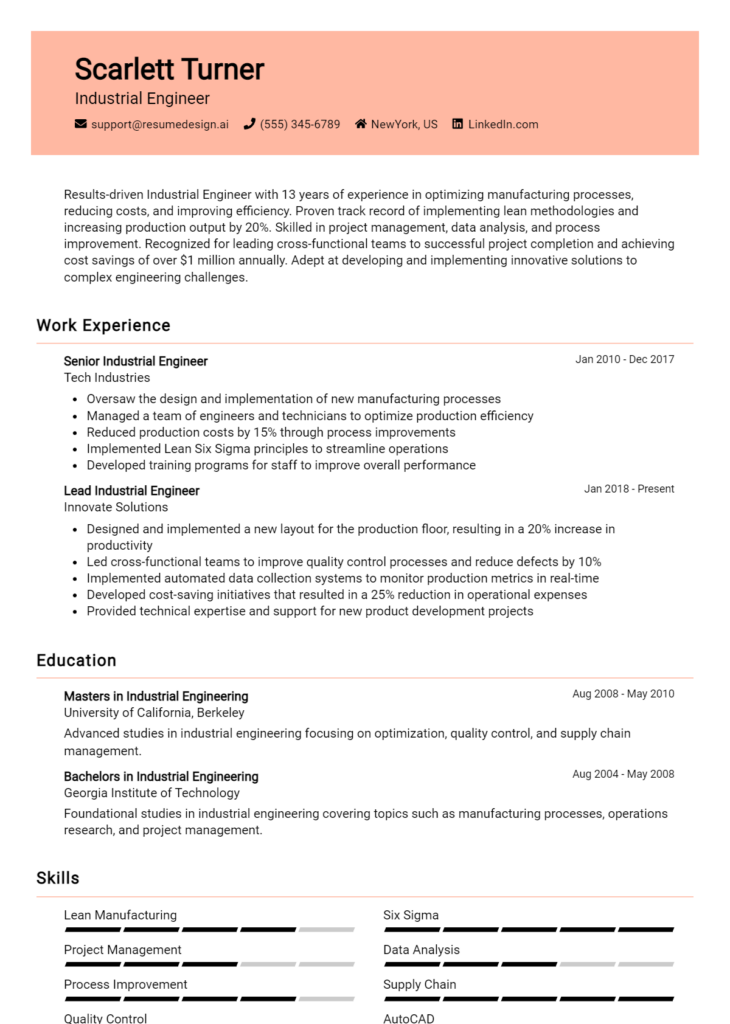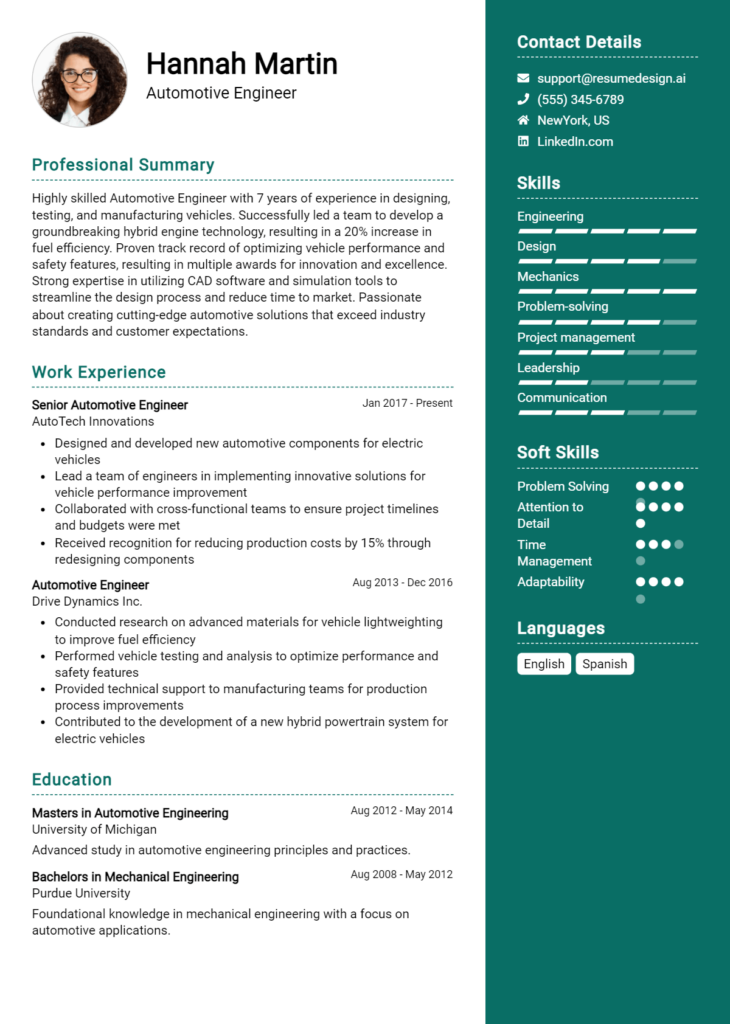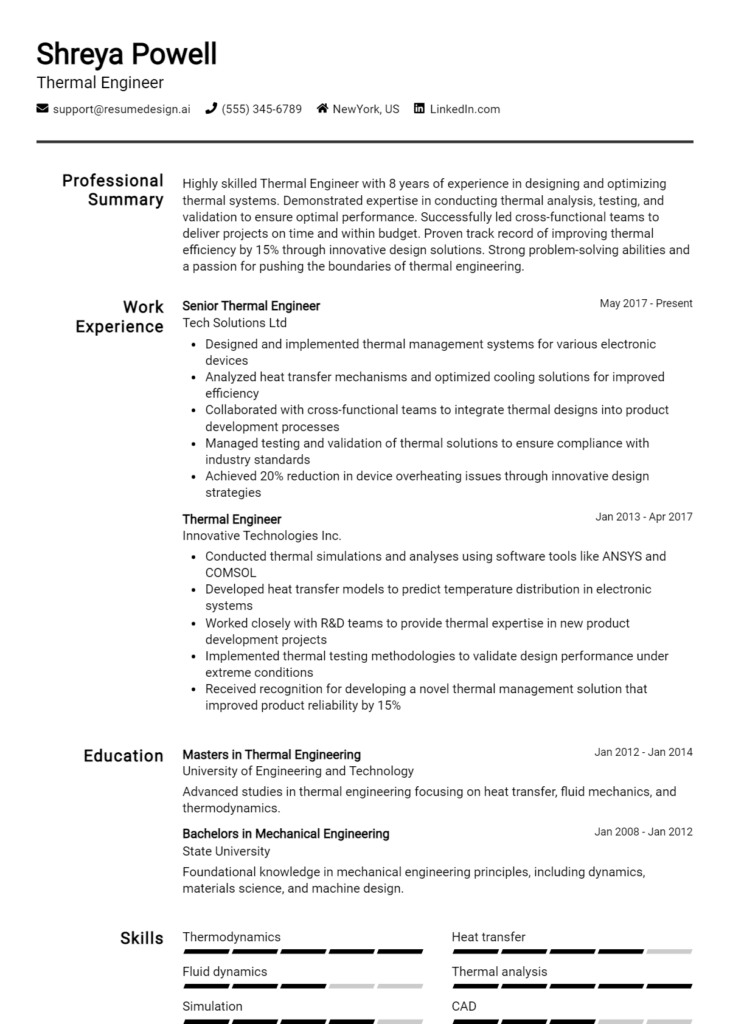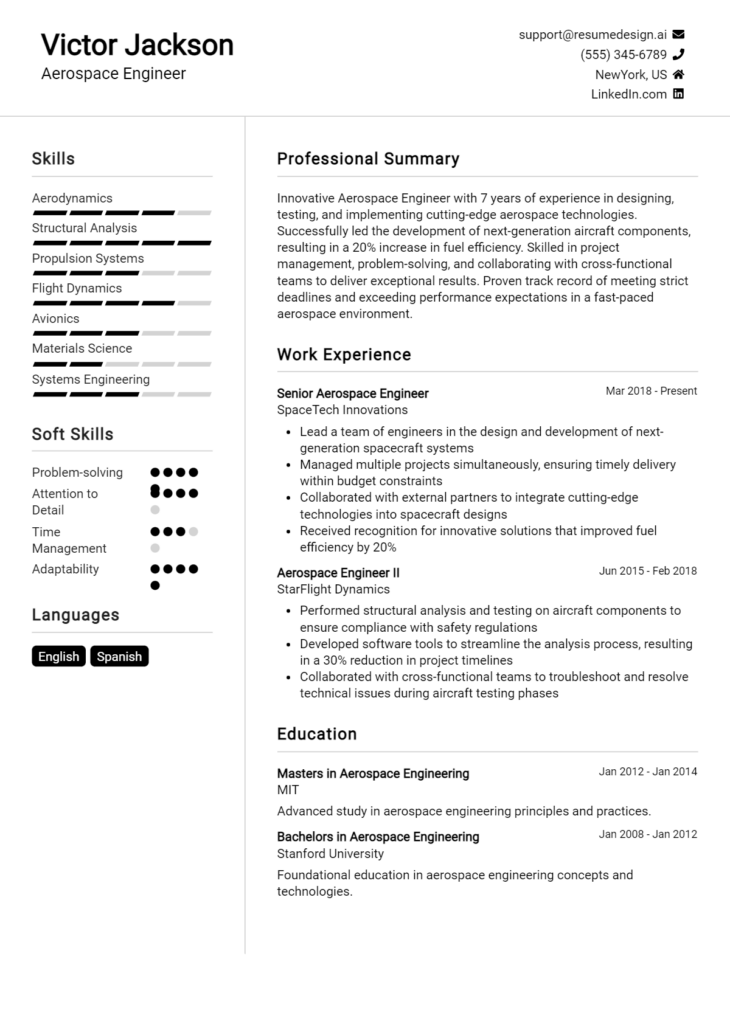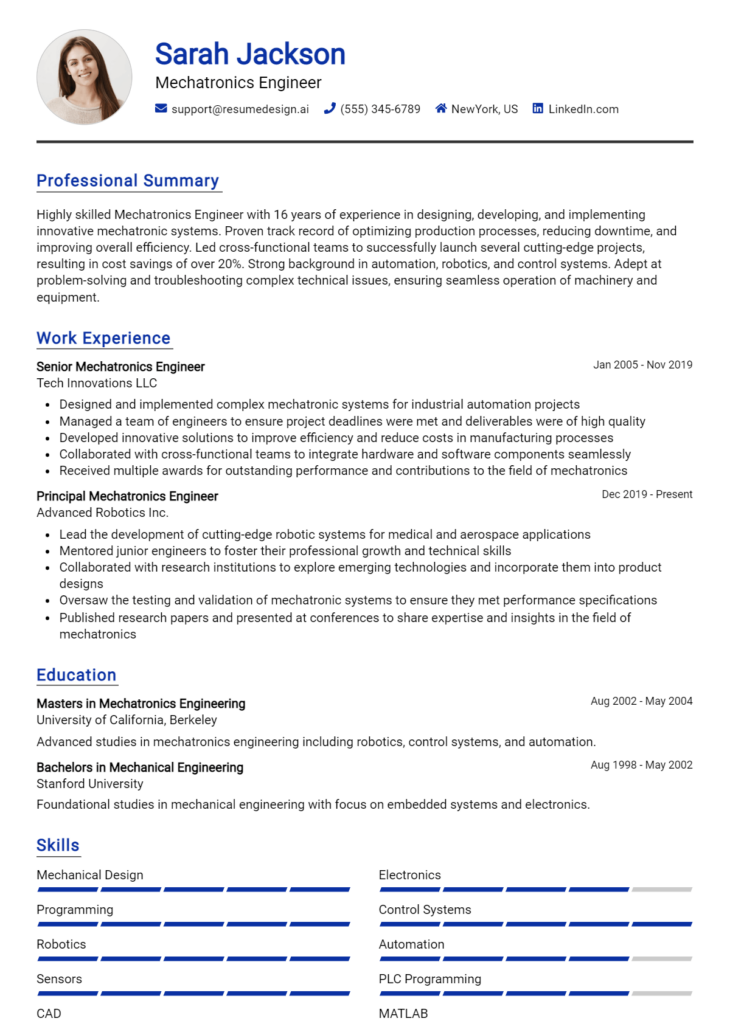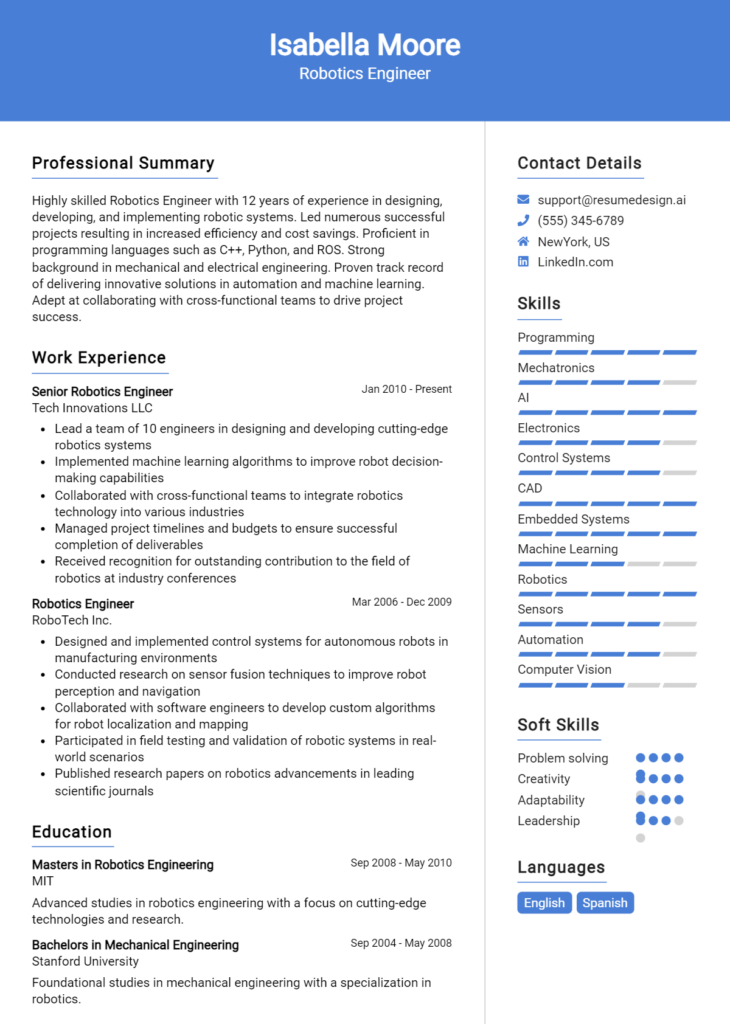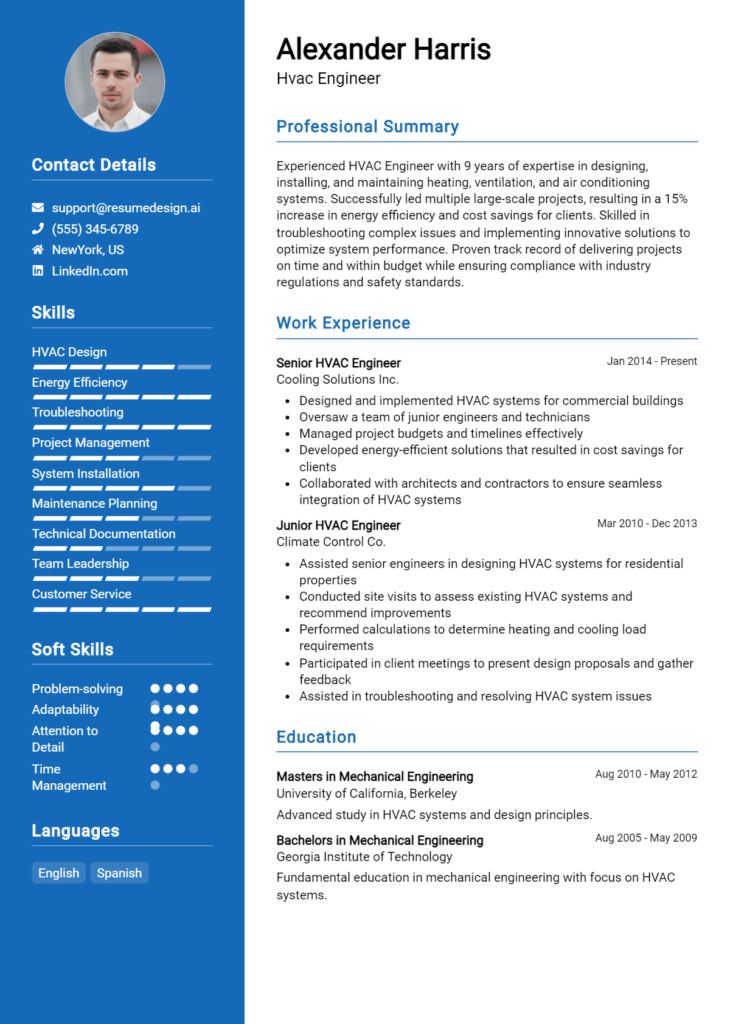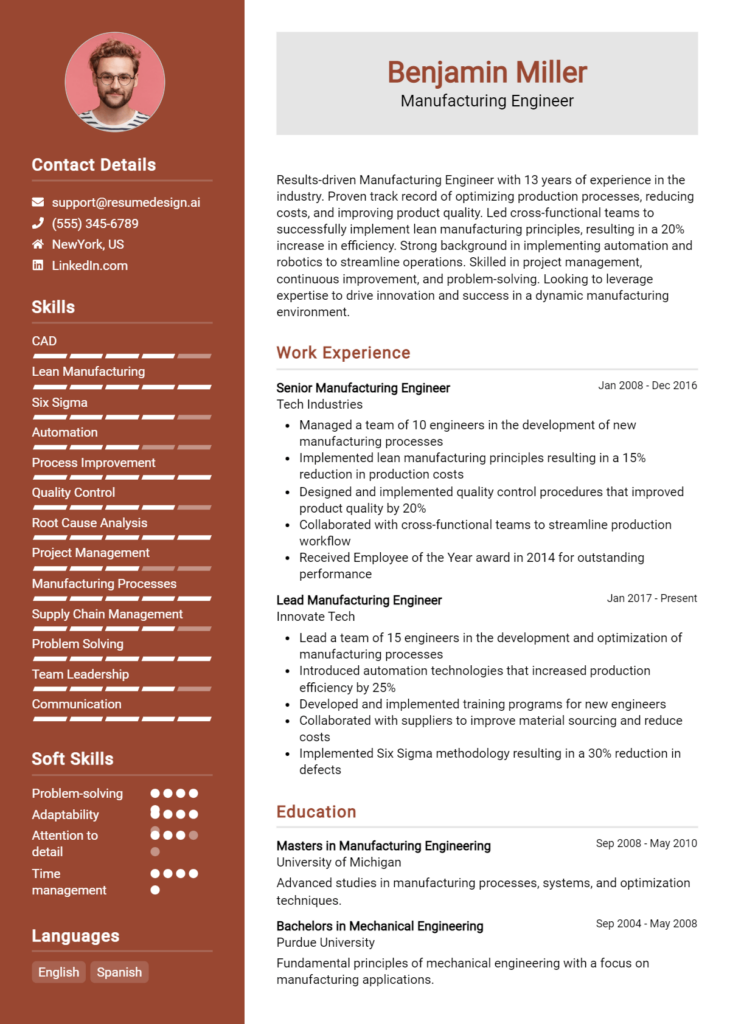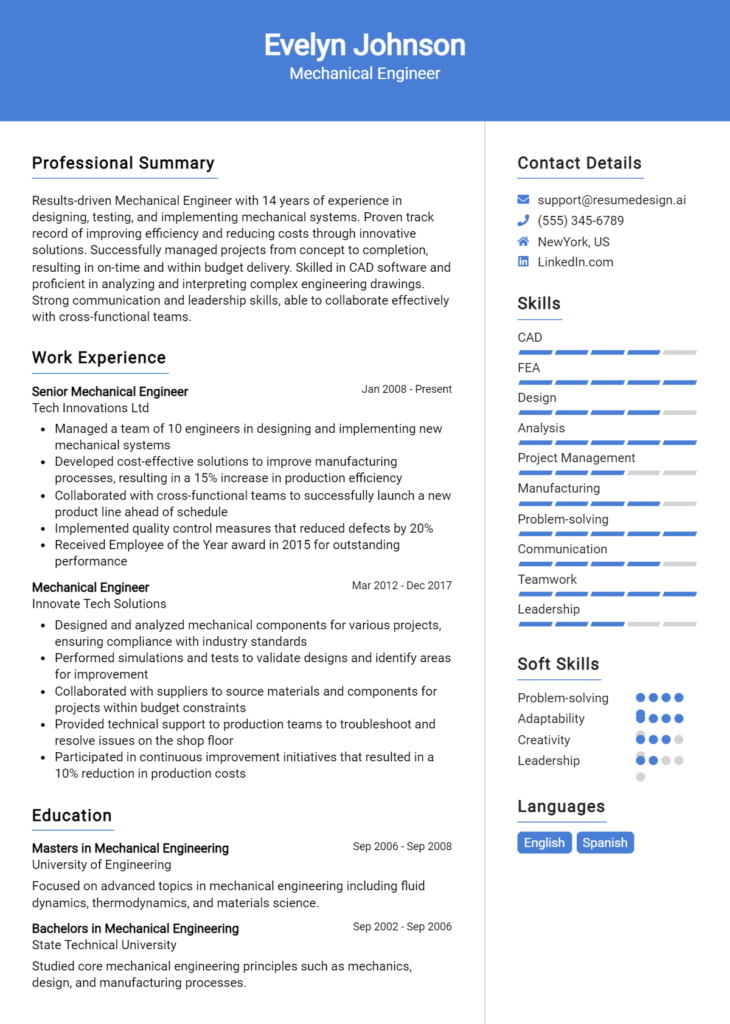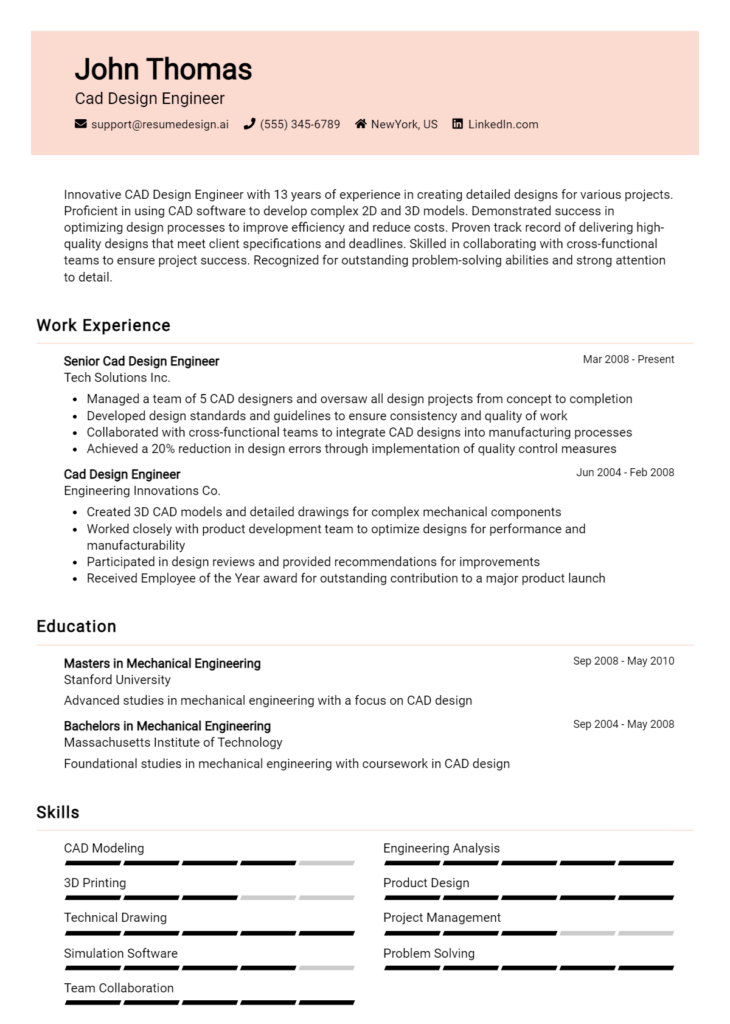Reliability Engineer Core Responsibilities
A Reliability Engineer plays a crucial role in ensuring the dependability of systems and processes across various departments. Their core responsibilities include conducting failure analysis, implementing predictive maintenance strategies, and optimizing system performance. A successful Reliability Engineer must possess strong technical skills, operational insight, and exceptional problem-solving abilities. These skills are vital for bridging gaps between engineering, manufacturing, and quality assurance, ultimately contributing to the organization's overall efficiency and reliability. A well-structured resume can effectively showcase these qualifications, highlighting the engineer's impact on organizational goals.
Common Responsibilities Listed on Reliability Engineer Resume
- Conduct root cause analysis on system failures to improve reliability.
- Develop and implement maintenance strategies and reliability programs.
- Analyze and interpret data to identify trends and potential issues.
- Collaborate with cross-functional teams to enhance product design.
- Perform risk assessments and reliability testing on equipment.
- Document and report findings to stakeholders for informed decision-making.
- Utilize reliability modeling techniques to predict equipment lifespan.
- Train and mentor team members on reliability best practices.
- Participate in continuous improvement initiatives to optimize processes.
- Ensure compliance with industry standards and regulations.
High-Level Resume Tips for Reliability Engineer Professionals
In today's competitive job market, a well-crafted resume is crucial for Reliability Engineer professionals seeking to make a strong first impression on potential employers. Your resume serves as a personal marketing tool that not only showcases your technical skills and relevant experience but also highlights your achievements in the field of reliability engineering. A compelling resume can set you apart from other candidates, making it essential to ensure that it accurately reflects your capabilities and contributions. This guide will provide practical and actionable resume tips specifically tailored for Reliability Engineer professionals, helping you to enhance your application and increase your chances of landing that desired role.
Top Resume Tips for Reliability Engineer Professionals
- Tailor your resume to the job description by incorporating keywords and phrases that match the specific requirements of the position.
- Highlight relevant experience by focusing on past roles that directly relate to reliability engineering and emphasizing your contributions.
- Quantify your achievements with specific metrics, such as percentage improvements in reliability, cost savings, or reduced downtime.
- Showcase industry-specific skills, such as predictive maintenance, failure analysis, and root cause analysis, to demonstrate your expertise.
- Include certifications and training relevant to reliability engineering, such as Six Sigma or Certified Reliability Engineer (CRE), to enhance credibility.
- Utilize a clean and professional format that emphasizes readability, ensuring that employers can quickly identify key information.
- Incorporate a summary statement that succinctly captures your career goals and essential skills in reliability engineering.
- List technical proficiencies, including software tools and methodologies commonly used in reliability engineering, to highlight your technical acumen.
- Use action verbs to describe your responsibilities and achievements, making your contributions clear and impactful.
- Keep your resume concise, ideally one page, focusing on the most relevant information to maintain the reader's attention.
By implementing these tips, you can significantly enhance your resume and increase your chances of landing a job in the Reliability Engineer field. A well-structured and targeted resume will not only draw the attention of hiring managers but also clearly communicate your value as a candidate, making them eager to invite you for an interview.
Why Resume Headlines & Titles are Important for Reliability Engineer
In the competitive field of Reliability Engineering, crafting an impactful resume is crucial for capturing the attention of hiring managers. A resume headline or title serves as the first impression and sets the tone for the entire document. A strong headline can effectively summarize a candidate's key qualifications, making it easier for hiring managers to quickly identify their potential fit for the role. It should be concise, relevant, and directly aligned with the specific job being applied for, ensuring that it resonates with the needs of the employer while highlighting the applicant's unique strengths.
Best Practices for Crafting Resume Headlines for Reliability Engineer
- Keep it concise: Limit your headline to a single, impactful phrase.
- Be role-specific: Tailor the headline to reflect the specific requirements of the Reliability Engineer position.
- Highlight key skills: Emphasize the most relevant skills or qualifications that set you apart.
- Use action-oriented language: Choose dynamic verbs that convey your contributions effectively.
- Quantify achievements: Whenever possible, include numbers or metrics to illustrate your impact.
- Stay relevant: Avoid using generic terms; ensure every word speaks to the job description.
- Ensure clarity: Use simple language that can be easily understood by hiring managers.
- Reflect your experience level: Indicate your level of expertise, whether it’s entry-level, mid-career, or senior.
Example Resume Headlines for Reliability Engineer
Strong Resume Headlines
"Results-Driven Reliability Engineer with 5+ Years of Experience in Aerospace Systems"
“Expert in Failure Mode Effects Analysis (FMEA) and Root Cause Analysis with Proven Track Record”
“Reliability Engineer Specializing in Predictive Maintenance and Process Improvement”
Weak Resume Headlines
“Engineer Looking for Opportunities”
“Experienced Professional”
The strong headlines are effective because they are specific and tailored to the role of a Reliability Engineer, clearly showcasing key skills and relevant experiences that align with the job requirements. They provide immediate value by highlighting the candidate’s expertise and achievements. In contrast, the weak headlines fail to impress because they are vague and generic, lacking the specificity needed to capture a hiring manager's attention. Such headlines do not convey the candidate's unique qualifications or relevant experiences, making it difficult for employers to see the potential fit for the position.
Writing an Exceptional Reliability Engineer Resume Summary
A well-crafted resume summary is essential for a Reliability Engineer as it serves as the first impression for hiring managers. This brief yet powerful statement quickly captures attention by showcasing key skills, relevant experience, and notable accomplishments that align with the job requirements. A strong summary not only highlights what makes the candidate a great fit but also sets the tone for the rest of the resume. It should be concise, impactful, and tailored to the specific position being applied for, ensuring that it resonates with the hiring team's priorities.
Best Practices for Writing a Reliability Engineer Resume Summary
- Quantify Achievements: Use specific numbers or percentages to demonstrate the impact of your work, such as improved reliability metrics or cost savings.
- Focus on Core Skills: Highlight key skills relevant to reliability engineering, such as root cause analysis, failure mode effects analysis (FMEA), and predictive maintenance.
- Be Job-Specific: Tailor your summary to reflect the specific requirements and responsibilities outlined in the job description.
- Highlight Relevant Experience: Mention years of experience and key projects that align with the reliability engineering field.
- Showcase Certifications: Include relevant certifications, such as Certified Reliability Engineer (CRE), that enhance your qualifications.
- Use Action Verbs: Start sentences with strong action verbs to convey your accomplishments and contributions effectively.
- Keep it Concise: Aim for 2-4 sentences that deliver maximum impact without overwhelming the reader.
- Emphasize Soft Skills: Include essential soft skills such as teamwork, communication, and problem-solving that complement technical expertise.
Example Reliability Engineer Resume Summaries
Strong Resume Summaries
Detail-oriented Reliability Engineer with over 8 years of experience in implementing predictive maintenance strategies that have improved equipment uptime by 25%. Skilled in root cause analysis and FMEA, leading cross-functional teams to enhance product reliability and reduce defects by 15%.
Results-driven Reliability Engineer with a proven track record of reducing operational costs by 30% through the development of robust reliability testing protocols. Holds a Certified Reliability Engineer (CRE) certification and excels in utilizing statistical analysis to drive data-informed decisions.
Dedicated Reliability Engineer with expertise in data analysis and reliability modeling, successfully increasing the lifespan of critical machinery by 20%. Known for collaborating effectively with engineering teams to implement continuous improvement initiatives that enhance system performance and reliability.
Weak Resume Summaries
Experienced engineer looking for a reliability position and hoping to use my skills in a new environment.
Reliability Engineer with some experience in the field, interested in improving systems and processes.
The strong resume summaries are effective because they provide specific, quantifiable achievements that directly relate to the role of a Reliability Engineer, showcasing the candidate’s impact in previous positions. They are tailored, concise, and highlight both technical skills and relevant experience. In contrast, the weak summaries lack detail, specificity, and fail to convey the candidate's value, making them less appealing to hiring managers. They do not provide concrete evidence of accomplishments or expertise, which diminishes their potential impact.
Work Experience Section for Reliability Engineer Resume
The work experience section of a Reliability Engineer resume is crucial as it serves as a key indicator of the candidate's technical skills, leadership capabilities, and their ability to deliver high-quality products in a collaborative environment. This section not only reflects the hands-on experience that a candidate possesses but also highlights their achievements in quantifiable terms, demonstrating their impact on previous projects and teams. Aligning this experience with industry standards is paramount, as it showcases the candidate's understanding of best practices and methodologies that govern reliability engineering.
Best Practices for Reliability Engineer Work Experience
- Detail technical skills relevant to reliability engineering, such as statistical analysis, failure mode effects analysis (FMEA), and root cause analysis.
- Quantify achievements with specific metrics, such as improved system uptime percentages or reduced failure rates.
- Highlight leadership roles and initiatives, showcasing the ability to manage teams and projects effectively.
- Demonstrate collaboration with cross-functional teams, emphasizing communication skills and teamwork.
- Include relevant industry certifications or training that bolster credibility and technical knowledge.
- Use action verbs to convey impact and engagement in previous roles.
- Tailor the experience to align with specific job descriptions, focusing on relevant duties and accomplishments.
- Maintain clarity and conciseness, ensuring that each bullet point communicates a significant contribution or learning experience.
Example Work Experiences for Reliability Engineer
Strong Experiences
- Led a cross-functional team to implement a predictive maintenance program, resulting in a 30% reduction in equipment downtime over 12 months.
- Developed and executed a reliability testing protocol that improved product lifespan by 25%, directly contributing to a 15% increase in customer satisfaction ratings.
- Collaborated with design engineers to perform failure mode effects analysis (FMEA), identifying key design improvements that reduced warranty claims by 40%.
- Managed a team of 5 engineers in a project that successfully identified and mitigated critical failure risks, enhancing the overall reliability of the product line by 20%.
Weak Experiences
- Worked on various engineering projects and assisted in general tasks.
- Participated in team meetings to discuss reliability issues.
- Helped with data collection for engineering reports.
- Involved in some reliability testing activities.
The examples listed as strong experiences are considered effective because they provide specific, quantifiable outcomes that demonstrate the candidate's impact and technical leadership. They illustrate not only the candidate's skills but also their ability to drive significant improvements in reliability and team performance. In contrast, the weak experiences are vague and lack measurable results or clear contributions, making them less compelling to potential employers. They fail to showcase any significant achievements or technical expertise, which are critical in the field of reliability engineering.
Education and Certifications Section for Reliability Engineer Resume
The education and certifications section of a Reliability Engineer resume is crucial as it showcases the candidate's academic background and industry-relevant qualifications. This section not only highlights the foundational knowledge acquired through formal education but also emphasizes the importance of continuous learning through certifications and specialized training. By including relevant coursework, recognized certifications, and ongoing professional development, candidates can significantly enhance their credibility and demonstrate a strong alignment with the demands of the Reliability Engineer role, ultimately making a compelling case for their candidacy.
Best Practices for Reliability Engineer Education and Certifications
- Include degrees related to engineering, mathematics, or statistics that directly relate to reliability concepts.
- Highlight industry-recognized certifications, such as Certified Reliability Engineer (CRE) or Six Sigma Green Belt.
- List relevant coursework that showcases skills in reliability analysis, risk management, and quality control.
- Ensure certifications are current and reflect ongoing professional development.
- Use clear and concise language, avoiding jargon that may not be understood by all reviewers.
- Prioritize certifications and training that are specifically recognized in the reliability engineering field.
- Consider including workshops, seminars, or online courses that demonstrate a commitment to staying updated.
- Be specific about the dates of completion for degrees and certifications to indicate the recency of the knowledge gained.
Example Education and Certifications for Reliability Engineer
Strong Examples
- Bachelor of Science in Mechanical Engineering, University of XYZ, Graduated May 2020
- Certified Reliability Engineer (CRE), American Society for Quality, Certified in 2021
- Six Sigma Black Belt Certification, ASQ, Completed in 2022
- Coursework in Reliability Engineering and Risk Assessment, University of ABC
Weak Examples
- Associate Degree in General Studies, Community College, Graduated June 2018
- Certification in Basic Computer Skills, Online Course, Completed 2019
- Workshop on Time Management, Local Community Center, Attended 2020
- Outdated certification in Project Management, Certified in 2015
The strong examples are considered effective because they directly relate to the skills and knowledge required for a Reliability Engineer, showcasing relevant degrees and certifications that are recognized in the industry. In contrast, the weak examples lack relevance to the field, featuring outdated or general qualifications that do not contribute to the candidate's credibility in reliability engineering. This distinction highlights the importance of focusing on education and certifications that align with the specific demands of the job role.
Top Skills & Keywords for Reliability Engineer Resume
As a Reliability Engineer, showcasing the right skills on your resume is crucial for standing out in a competitive job market. Employers are looking for candidates who not only possess technical expertise but also have the ability to effectively communicate, problem-solve, and work collaboratively. A well-crafted resume highlights both hard and soft skills, demonstrating your comprehensive capabilities. This balance not only reflects your technical proficiency but also your adaptability and interpersonal strengths, which are essential for ensuring system reliability and performance. For more insights on how to enhance your resume, explore relevant skills and work experience sections.
Top Hard & Soft Skills for Reliability Engineer
Soft Skills
- Excellent communication skills
- Strong analytical thinking
- Team collaboration
- Problem-solving abilities
- Attention to detail
- Time management
- Adaptability and flexibility
- Leadership qualities
- Critical thinking
- Conflict resolution
Hard Skills
- Reliability engineering principles
- Statistical analysis and modeling
- Failure Mode and Effects Analysis (FMEA)
- Root Cause Analysis (RCA)
- Predictive maintenance techniques
- Risk assessment and management
- Knowledge of reliability software tools (e.g., Weibull Analysis)
- Quality control methodologies
- Data analysis and interpretation
- Understanding of relevant industry standards (e.g., ISO 9001, APQP)
Stand Out with a Winning Reliability Engineer Cover Letter
Dear Hiring Manager,
I am writing to express my interest in the Reliability Engineer position at [Company Name], as advertised on [Job Platform]. With a solid background in engineering principles and a passion for enhancing system reliability, I believe my skills align perfectly with the requirements of this role. My experience in conducting root cause analysis, implementing reliability-centered maintenance strategies, and collaborating with cross-functional teams has equipped me with the tools necessary to contribute effectively to your organization.
During my previous role at [Previous Company Name], I successfully led a project aimed at improving the reliability of our production systems, which resulted in a 30% reduction in downtime and a 25% increase in overall equipment effectiveness. By employing data-driven methodologies and predictive analytics, I was able to identify potential failure modes and implement proactive measures that significantly decreased operational risks. My dedication to continuous improvement and my ability to leverage statistical analysis tools have consistently driven positive outcomes in my projects.
I am particularly drawn to [Company Name] because of its commitment to innovation and excellence in the industry. I am excited about the opportunity to apply my expertise in reliability engineering to help optimize your systems and processes. I am confident that my proactive approach, strong analytical skills, and ability to work collaboratively with diverse teams will make a valuable contribution to your organization.
Thank you for considering my application. I look forward to the opportunity to discuss how I can support [Company Name] in achieving its reliability goals and enhancing its operational performance.
Sincerely,
[Your Name]
[Your Phone Number]
[Your Email Address]
Common Mistakes to Avoid in a Reliability Engineer Resume
When crafting a resume for a Reliability Engineer position, it is crucial to present your skills and experiences effectively to stand out in a competitive job market. However, many candidates make common mistakes that can undermine their chances of landing an interview. Avoiding these pitfalls can significantly enhance the impact of your resume, showcasing your qualifications in the best possible light.
Vague Job Descriptions: Failing to provide specific details about your previous roles can leave employers unclear about your expertise and contributions. Use quantifiable results and specific projects to illustrate your impact.
Ignoring Keywords: Many companies use Applicant Tracking Systems (ATS) to filter resumes. Neglecting to include relevant keywords related to reliability engineering can result in your resume being overlooked.
Overloading with Technical Jargon: While technical skills are essential, using overly complex language can alienate hiring managers who may not have a technical background. Strive for clarity and balance between technical terms and accessible language.
Lack of Tailoring: Submitting a generic resume that doesn’t align with the specific job description can signal a lack of interest. Customize your resume for each application, highlighting experiences and skills that match the job requirements.
Neglecting Soft Skills: Reliability Engineering isn’t just about technical know-how; soft skills like communication, teamwork, and problem-solving are equally important. Ensure these attributes are evident in your resume.
Poor Formatting: A cluttered or hard-to-read resume can detract from your qualifications. Use clear headings, bullet points, and consistent formatting to create a professional and easy-to-navigate document.
Omitting Certifications and Training: Reliability Engineers often require specific certifications or training. Failing to list relevant credentials can diminish your perceived expertise in the field.
Ignoring Accomplishments: Listing duties without mentioning achievements can make your resume less compelling. Focus on what you accomplished in your roles, using metrics and outcomes to demonstrate your success.
Conclusion
In this article, we explored the essential responsibilities and skills required for a Reliability Engineer, emphasizing the importance of proactive maintenance, risk assessment, and data analysis in ensuring the longevity and performance of systems. We also discussed the significance of cross-functional collaboration with teams such as design, manufacturing, and quality assurance to enhance product reliability.
To make a strong impression in this competitive field, it's crucial to have a well-crafted resume that effectively showcases your qualifications and experience. As you reflect on your career as a Reliability Engineer, consider updating your resume to highlight relevant skills, accomplishments, and certifications that align with industry standards.
Take advantage of the various resources available to help you create a standout application. Check out our resume templates for professional designs, use our resume builder to easily format your information, explore resume examples for inspiration, and don't forget to craft a compelling cover letter using our cover letter templates.
Now is the time to review your Reliability Engineer resume and ensure it reflects your best self. Start today!

